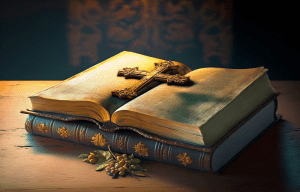
I recently came across a post on X (formerly Twitter) showing a woman wearing a t-shirt with the words, “I’ve had 21 abortions!” There has been much ink spilled on the topic of abortion, and I will not add much more in this essay. Rather, I want to use the subject of abortion as a point of departure and place it into the broader context of original sin and human volition.
I will commence by examining will in a philosophical sense and the need for a well-formed conscience. Lastly, I will endeavor to show the connection between human will and original sin.
The Human Will
All living creatures seek that which they deem to be good. The will is the efficient cause of the intellect in that its appetitive powers move the intellect. The intellect is the final cause of the will in that the will seeks the good which is known by the intellect.
In a practical sense, therefore, the will desires a good; the intellect determines the validity of the good sought by the will, prioritizes among various goods, and develops a course for obtaining the good.
In returning to the woman who had twenty-one abortions, we can deduce that her will desired the perceived good of not bringing a child to term, and her intellect deemed that an abortion was the best course for achieving that goal. This also illuminates the difference between the advantageous and the noble: the advantageous seeks its own good, and the noble seeks the good of others.
We can begin to see that this process is entirely subjective. That is, the good perceived relates only to the individual. As such, there is no effort to appeal to an objective moral standard. Despite this, human beings possess a facility that allows them to access objective criteria for morality. This power is known as conscience.
God And Conscience
Conscience is the capacity of the intellect to make judgments regarding right and wrong actions. These judgments are based on an appeal to an objective moral standard. From the Catholic perspective, this standard is the mind of God, knowable through natural law. For this reason, John Henry Newman referred to the conscience as the “aboriginal vicar of Christ in the soul.”
Conscience is a specific act of the mind applying knowledge to a concrete moral situation. Put differently, conscience seeks to apply objective moral truths to particular circumstances. Therefore, it follows that judgments of right and wrong are not based on what the individual feels but on the judgment of a well-formed conscience.
A word about the term “well-formed.” Owing to the damage done by original sin, the conscience does not operate as it ought but rather requires it to be informed and its moral judgment enlightened, with the goal being that the conscience is upright and truthful.
The Word of God is the light for our path in forming our conscience. We must assimilate it in faith and prayer and put it into practice. Assisted by the Holy Spirit and the teaching of the Church, we must examine our conscience in the context of an objective moral order.
Original Sin And The Will To Power
If one frequently does what God does, one becomes as God is. Or so goes the first lie of the Devil. “God knows well that when you eat of it [the tree of good and evil], your eyes will be opened, and you will be like gods, who know good and evil.” So saith the serpent to Eve in the Garden of Eden. (See Genesis 3:5).
The human desire to appropriate for itself those things that properly belong to God alone is the basis for original sin. Specifically, human beings have sought to arrogate morality. This is most easily done by denying the existence of God or – and this is what one sees in the Genesis account of original sin – by subordinating the will of God to one’s own will.
In today’s culture, elements of both ways of subverting God’s will are present. Atheism denies God’s existence to allow the individual to be free from any objective moral judgment. Alternatively, how frequently do we believers seek to do our will even when it contradicts God? Indeed, this is a basic definition of sin.
Regardless of the approach, volition—the human will—precipitates. The sophisticated atheist realizes this and, therefore, raises the will above the conscience. Consciously or not, one sees the influence of Friedrich Nietzsche’s concept of “will to power” in much of modernity’s thinking.
In once again returning to the women who had twenty-one abortions, one sees the celebration of the will with no appeal to the conscience or objective morality. In such instances, the desires of the individual become the sole determinant of morality.
The Catholic, too, engages in this struggle between conscience and will. The Catholic, too, struggles with following the dictates of his conscience or submitting to the base desires of the will.
It is precisely because Catholics are engaged in this struggle that the Church emphasizes the formation of the conscience and the use of the sacraments, particularly confession.
Conclusion
In a very real sense, the spiritual life involves a battle of wills. Often, this conflict appears as the ultimate good of God versus the subjective desires of the individual. As Catholics, we are called to “deny ourselves,” deny our desires so as to seek the will of God.
Perhaps a better way of framing the conflict is to see our work as Catholics as an effort to conform our desires to God’s will. To that end, Saint Maximilian Kolbe writes, “Christian perfection consists in the union of our will with the will of God.”












